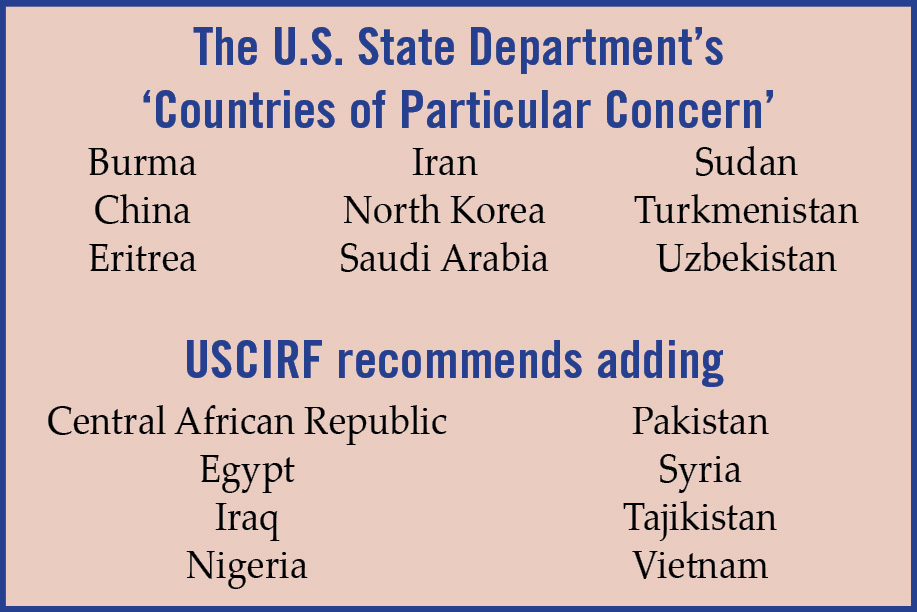By Cherilyn Crowe
A “horrified world” watched violence masquerading as religious devotion erupt over the past year, which is reviewed in the latest report from the U.S. Commission on International Religious Freedom.
The independent commission created by Congress in 1998 released its annual report April 30, documenting religious freedom violations, making country-specific recommendations and assessing the U.S. government’s implementation of the International Religious Freedom Act.
Among the 33 countries cited for violations, this year’s USCIRF report provides a grim picture of the state of religious freedom in several geographic areas.
Detailing atrocities committed by ISIL in both Iraq and Syria, the report notes that no religious group has been free from its havoc. “ISIL has unleashed waves of terror upon Yazidis and Christians, Shi’a and Sunnis, as well as others who have dared to oppose its extremist views,” the report states.
The report reviews the Boko Haram attacks on Christians and Muslims in Nigeria, including kidnappings and mass murders at churches and mosques.
It also highlights people forced to flee their homes because of religious persecution, such as Rohingya Muslims and Kachin Christians in Burma.
“By any measure, the horrors of the past year speak volumes about how and why religious freedom and the protection of the rights of vulnerable religious communities matter,” according to the report.
USCIRF affirms the State Department’s list of nine “Countries of Particular Concern” (CPCs), and it recommends a continued designation of Burma, China, Eritrea, Iran, North Korea, Saudi Arabia, Sudan, Turkmenistan and Uzbekistan as such.
The commission also recommends adding eight other countries to the CPC list: Central African Republic, Egypt, Iraq, Nigeria, Pakistan, Syria, Tajikistan and Vietnam.
This is the first time the commission recommended adding the Central African Republic. After a 2013 coup resulted in lawlessness, the country has experienced ethnic cleansing, religious targeting and sectarian violence that merits the designation.
USCIRF’s report recognizes that non-state actors are often some of the most egregious violators of religious freedom, such as in the Central African Republic and areas of Iraq and Syria. The commission concluded that the CPC classification should be expanded to allow for designations in those areas, even though a government does not exist or does not control its territory.
The commission noted that ten other countries have serious violations, but do not meet the CPC standard. It recommended these be labeled as “Tier 2” countries: Afghanistan, Azerbaijan, Cuba, India, Indonesia, Kazakhstan, Laos, Malaysia, Russia and Turkey.
The report recommends that the United States and like-minded nations engage in emergency action to combat the humanitarian crises created by these violations. It commended the U.S. government for helping save numerous Yazidis from the hands of ISIL and providing humanitarian aid.
The report notes, however, that help is not enough. The only permanent solution to guarantee the safety and survival of the persecuted is “the full recognition of religious freedom as a sacred human right” by every individual and nation.
From the May 2015 Report from the Capital. Click here to read the next article.
Click here to view the entire magazine as a PDF document.





